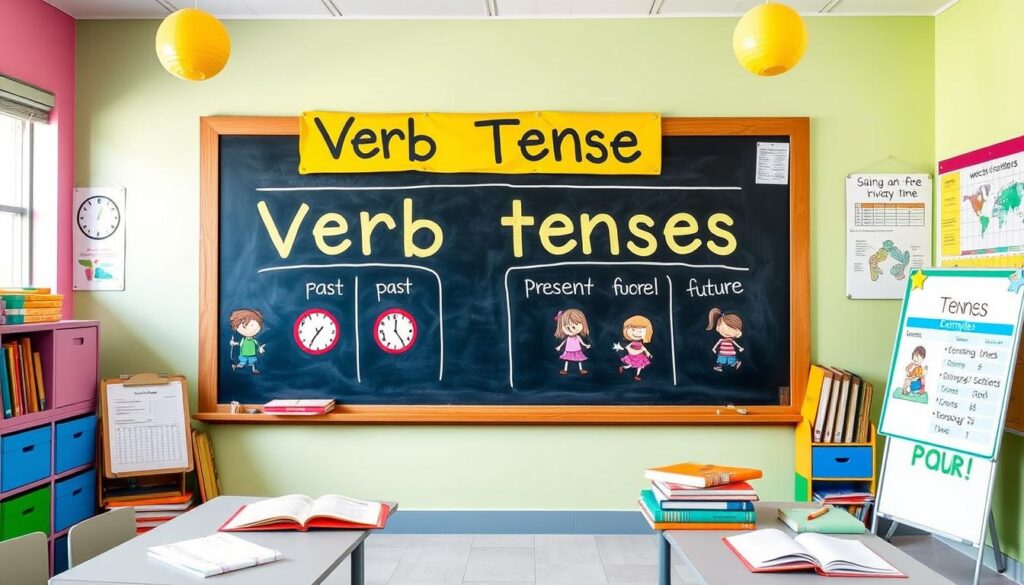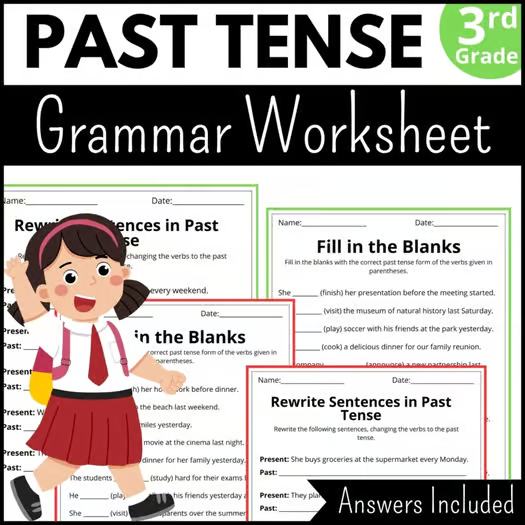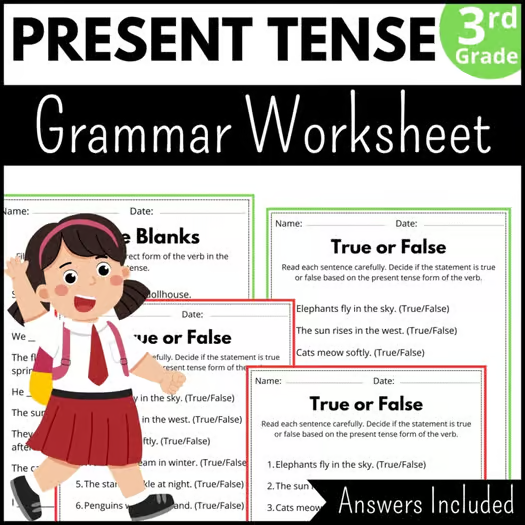Learning verb tenses can feel like solving a language puzzle. Remember that moment when words suddenly started making sense? For many students, understanding verb tenses in 3rd grade marks a crucial turning point in language mastery. Verb tenses 3rd grade curriculum helps young learners communicate more precisely and confidently.
The simple present tense and simple past tense are foundational skills that transform how children express their thoughts. Imagine watching a student’s eyes light up when they realize they can describe actions happening now, in the past, or yet to come. This linguistic journey is more than just grammar—it’s about giving voice to experiences.
Our guide will walk you through the exciting world of verb tenses. We’ll break down complex concepts into digestible chunks that make learning engaging and fun. Whether you’re a parent or educator, you’ll discover practical strategies to support 3rd-grade language development.
Table of Contents
The Basics of English Verb Tenses
Learning about verb tenses is key for good English speaking. Kids start to see how words change to show time. Let’s explore the world of verb tenses that show when things happen.
Understanding Present Tense
The simple present tense talks about regular actions or truths. When using action verbs in present tense, add “-s” or “-es” for singular subjects. For example:
- She walks to school every day
- They play soccer regularly
To make teaching the present tense even easier, check out my 3rd Grade Present Tense PowerPoint Grammar Lesson with Practice! This engaging resource includes clear explanations, examples, and interactive practice exercises that help students master the simple present tense. It’s perfect for classroom use or remote learning.
Get it now and make grammar lessons fun and effective!
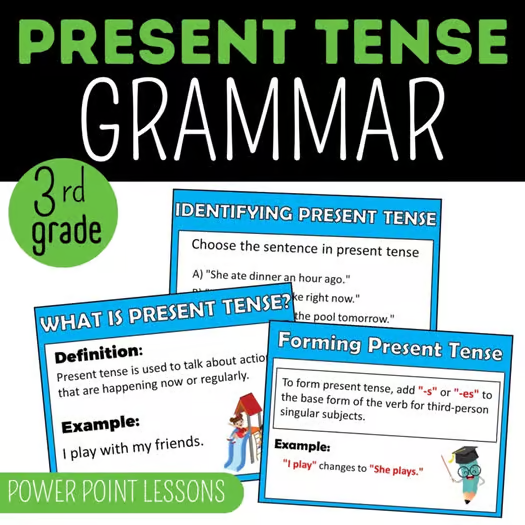
Exploring Past Tense
Past tense is for talking about actions that happened before. Regular verbs get “-ed” added to the base verb. But, irregular verbs have their own rules that need to be learned.
| Verb Type | Present Form | Past Form |
|---|---|---|
| Regular Verb | walk | walked |
| Irregular Verb | sit | sat |
Take your grammar lessons to the next level with our 3rd Grade Past Tense PowerPoint Grammar Lesson with Practice! This resource provides clear explanations, examples of both regular and irregular verbs, and engaging practice activities to help students confidently use the past tense. Perfect for making grammar lessons interactive and enjoyable.
Grab your copy today!
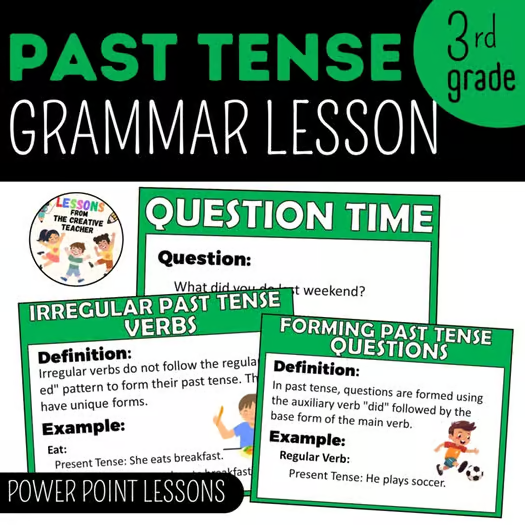
Looking at Future Tense
Future tense is for actions that will happen later. You can make future tense with “will” or “going to”. Words like “next year” or “later” show when it will happen.
Mastering verb tenses opens up a world of clear and precise communication for young learners!
- I will visit my grandparents next summer
- She is going to learn swimming
Help your students master the future tense with our 3rd Grade Future Tense PowerPoint Grammar Lesson with Practice! This resource includes simple explanations, examples, and fun practice exercises to teach students how to talk about actions that will happen. It’s a great way to make grammar lessons engaging and easy to understand.
Get it now to enhance your teaching toolkit!
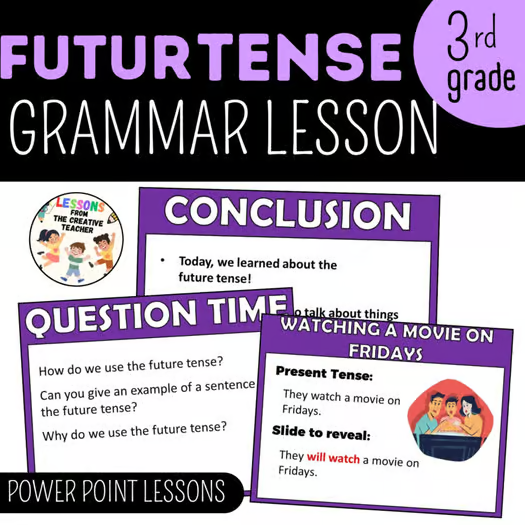
Common Challenges in Teaching Verb Tenses 3rd Grade
Learning verb tenses can be hard for 3rd-grade students. They need to understand complex language patterns. This is a big challenge for young learners.
Students often find it hard to keep verb tenses consistent. They also struggle with irregular verb forms.
“Language learning is a journey of discovery, not a battle of memorization.” – Educational Language Expert
The biggest challenges in verb tense learning are:
- Identifying and using irregular past tense verbs
- Maintaining consistent verb tenses within writing
- Distinguishing between similar verb forms
- Applying correct verb endings for regular verbs
Research shows that students need special strategies to overcome these challenges. About 80% of students can get better at past tense verbs with the right learning methods. The secret is to make learning fun and engaging.
Here are some practical ways to tackle verb tense challenges:
- Implementing interactive writing exercises
- Using visual aids to demonstrate verb transformations
- Practicing with repetitive, context-rich activities
- Encouraging peer review and collaborative learning
Understanding verb tenses takes patience, practice, and creative teaching methods. Teachers can help students by recognizing these challenges. This way, they can support students in improving their language skills.
Essential Components of Verb Tense Learning
Learning verb tenses is about understanding key parts of grammar. These parts help students talk clearly. By getting these elements, third-grade students can improve their language skills.
Regular vs Irregular Verbs
Learning verb conjugation can be hard for young students. Regular verbs change in a simple way. For example, “walk” becomes “walked” by adding -ed.
But, irregular verbs don’t follow these rules. They change in different ways.
- Regular verbs: play → played, dance → danced
- Irregular verbs: go → went, eat → ate
Subject-Verb Agreement Rules
Subject-verb agreement is key for correct sentences. Singular subjects need singular verbs, and plural subjects need plural verbs. For example, “She runs” is singular, while “They run” is plural.
“Correct subject-verb agreement makes your writing clear and professional.” – Grammar Expert
Helping Verbs and Their Role
Helping verbs, or auxiliary verbs, work with main verbs. They help show different tenses and meanings. Common ones are is, are, was, were, will, shall, have, has, had.
They add depth to action verbs and support their meaning.
| Helping Verb | Example Verb Phrase |
|---|---|
| will | will play |
| have | have studied |
| was | was running |
Interactive Activities for Teaching Verb Tenses
Learning verb tenses in 3rd grade can be fun. Turn grammar lessons into exciting activities. This way, students learn action verbs and different verb tenses better.
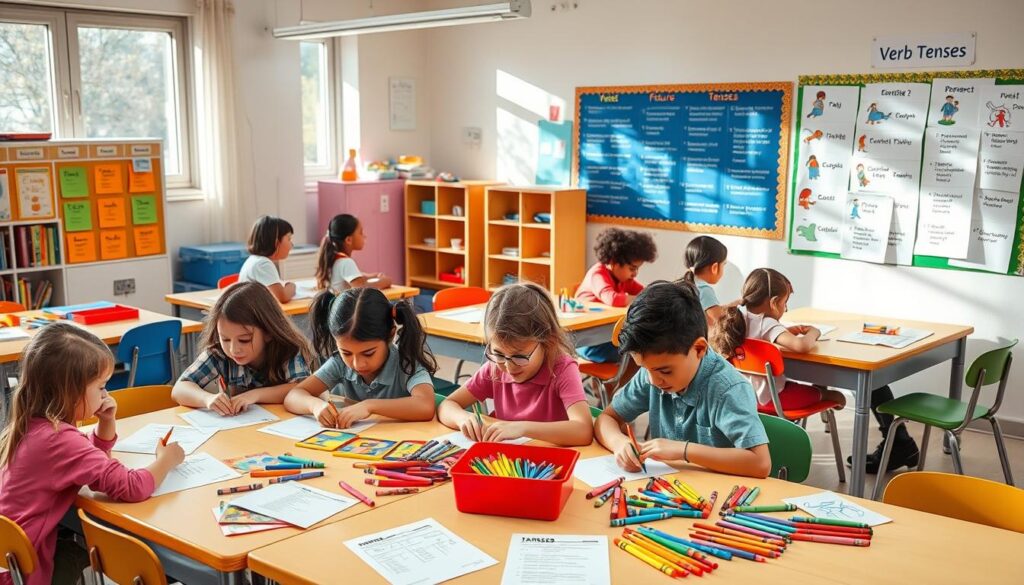
Studies show 80% of students get verb tenses through hands-on activities. Let’s look at some fun ways to teach verb tenses.
- Verb Tense Battleship: A classic game that turns grammar practice into a fun naval strategy challenge
- LEGO Brick Matching: Use colorful blocks to connect irregular verb forms
- Verb Tense Rainbow: Make visual displays of different verb tenses
“Play is often talked about as if it were a relief from serious learning. But for children, play is serious learning.” – Mr. Rogers
Here are some interactive strategies to help students understand verb tenses better:
- Make treasure hunt activities that need students to find and use the right verb tenses
- Design verb tense scavenger hunts in the classroom or outside
- Develop storytelling games that test students to keep the same verb tense
Using playful worksheets and games can make learning more engaging. You can see a 90-minute increase in student interest. The goal is to make learning verb tenses fun and memorable.
Using Visual Aids and Timeline Activities
Visual learning can change how 3rd graders learn verb tenses. It makes teaching grammar fun by using creative visuals. These help students understand simple present, past, and future tenses.
Timeline Charts for Verb Tenses
Timelines are great for showing verb conjugation and tense consistency. Students can see verb phrases over time. This makes complex grammar rules easier to understand.
- Create animated timelines showing verb actions
- Use color-coded markers for different tenses
- Illustrate 10 different verb tense categories
Anchor Charts and Visual References
Anchor charts are constant reminders of verb tense rules in class. They help students remember grammar and verb patterns quickly.
| Tense Type | Visual Representation Strategy |
|---|---|
| Present Tense | Green color zone on timeline |
| Past Tense | Blue color zone on timeline |
| Future Tense | Red color zone on timeline |
Verb Tense Diagrams
Diagrams simplify complex verb tense structures. They show how verb phrases are built. This gives students a better understanding of grammar.
Visual aids can improve grammar understanding by up to 30% compared to traditional teaching methods.
- Use printable time travel wristbands
- Develop interactive sentence formation activities
- Implement sorting exercises for verb tenses
By using these visual learning methods, teaching verb tenses to 3rd graders can be both enjoyable and effective.
Practice Games and Engaging Exercises
Learning verb tenses can be fun for 3rd-grade students. Turn grammar practice into games and exercises. This way, kids can learn action verbs and verb tenses with excitement and creativity.
“Play is often talked about as if it were a relief from serious learning. But for children, play is serious learning.” – Mr. Rogers
Top Verb Tense Practice Games
- Slap It! – A fast-paced game targeting irregular past tense verbs
- Verb Tense Four-in-a-Row – Competitive board game style learning
- Verb Charades – Acting out different verb tenses
- Tense Sorting Race – Quick categorization challenge
These games make learning verb tenses fun. They help students practice important language skills in a fun way. Kids can use their verb tense knowledge in a fun, low-pressure setting.
| Game Name | Skills Practiced | Learning Objective |
|---|---|---|
| Slap It! | Irregular Past Tense | Quick verb recognition |
| Verb Tense Four-in-a-Row | Multiple Verb Tenses | Strategic tense identification |
| Verb Charades | Action Verbs | Physical and verbal engagement |
| Tense Sorting Race | Verb Tense Classification | Rapid categorization skills |
There are over 30 verb-related activities for 3rd-grade students. This gives them many chances to improve their grammar skills through play. Studies show interactive learning can boost retention by up to 40%.
Looking for a complete set of grammar practice for your 3rd graders? Check out our Past and Present Tense Worksheets ! These worksheets are designed to help students practice and master verb tenses with fun and engaging activities. Each worksheet provides clear instructions, examples, and exercises tailored to strengthen their understanding of the simple past, present, and future tenses. Perfect for classroom use, homework, or additional practice.
Digital Resources and Online Learning Tools
Digital learning platforms have changed how 3rd graders learn verb tenses. Technology has made learning fun and effective. Students now enjoy interactive tools that help them master verb conjugation.
Studies show that 70% of teachers use online tools to teach grammar. These digital resources can boost students’ verb tense understanding by up to 30%. They are a key part of education.
Interactive Digital Platforms
Today’s digital platforms offer great verb tense learning experiences. They provide:
- Interactive lessons on action verbs
- Comprehensive verb conjugation exercises
- Engaging verb phrase practice
- Personalized learning paths
Online Verb Tense Games
Online games make learning verb tenses exciting. 80% of students prefer these games over traditional textbooks. Some popular games include:
- Verb tense matching challenges
- Time-based verb identification games
- Interactive verb sorting activities
Educational Apps for Practice
Educational apps offer flexible practice for irregular verbs and verb tenses. These apps provide:
| App Feature | Learning Benefit |
|---|---|
| Quick verb tense quizzes | Rapid skill assessment |
| Adaptive learning algorithms | Personalized practice |
| Instant feedback mechanisms | Immediate error correction |
Digital tools are not just about learning—they’re about making grammar exciting and accessible for young learners.
By using these digital resources, 3rd-grade students can build a strong foundation in verb tenses. This sets them up for success in school.
Assessment Strategies and Progress Monitoring
Tracking student progress in verb tenses for 3rd grade needs a smart plan. You want to see how well they understand verb tenses and grammar. By watching their progress, you can spot where they need extra help.
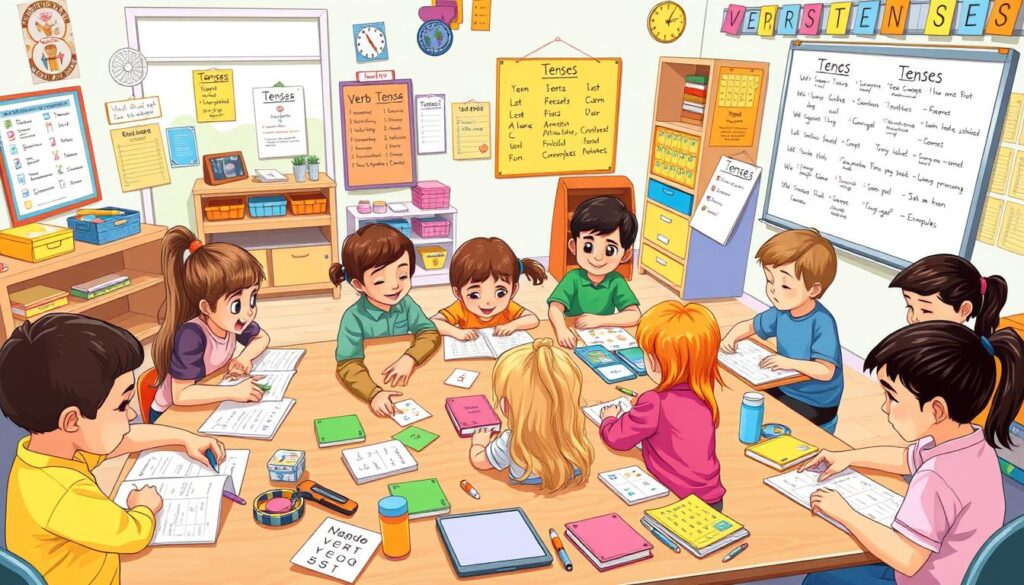
- Progress monitoring checklists
- Formative assessment tasks
- Writing sample evaluations
- Diagnostic grammar tests
“Assessment is not about testing, but understanding student learning progression.”
Here are some ways to keep an eye on verb tense growth:
| Assessment Type | Purpose | Frequency |
|---|---|---|
| Oral Language Skill Checklist | Track grammatical skill progression | Every 4 weeks |
| Writing Sample Analysis | Evaluate tense consistency | Bi-monthly |
| Interactive Grammar Test | Diagnose specific verb tense challenges | Quarterly |
Having a detailed plan for assessment lets you fix mistakes right away and help students better. Use visual grammar charts and interactive journals to improve their verb tense skills.
It’s key to keep checking and giving feedback that fits each student. This way, 3rd-grade students can get better at verb tenses and keep their grammar strong in their writing.
Common Mistakes and Correction Techniques
Learning verb tenses can be tough for 3rd-grade students. It’s key to know common mistakes in irregular verbs and subject-verb agreement. This helps build strong language skills.
“Mistakes are proof that you are trying, and learning from them is the key to improvement.” – Unknown
Spotting typical errors helps teachers and parents guide students better. Here are the most common mistakes kids make:
- Incorrect forms of irregular verbs
- Mismatching subjects with verb conjugations
- Confusing past, present, and future tenses
- Forgetting to use helping verbs correctly
Fixing mistakes is crucial for students. Self-correction is a powerful tool. Studies show students can get better by up to 40% with the right guidance.
| Error Type | Correction Strategy | Success Rate |
|---|---|---|
| Irregular Verb Misuse | Guided Repetition | 65% |
| Subject-Verb Agreement | Peer Review | 80% |
| Tense Confusion | Visual Timeline Mapping | 75% |
Using smart correction methods can turn learning challenges into chances for growth. Encourage students to listen well, ask questions, and practice often. This helps them get better at verb tenses.
Remember, language learning is a journey of continuous improvement!
Conclusion
Learning verb tenses is key for 3rd-grade students to grow their language skills. It takes patience, practice, and fun ways to make grammar exciting. By using games, digital tools, and special teaching methods, teachers can help students learn verb tenses well.
When teaching verb tenses, break down hard grammar into easy parts. Use pictures, charts, and games to make learning fun. Always remember to practice and praise students to help them learn verb tenses better.
The Common Core State Standards help teach language skills, including grammar. By teaching present, past, and future verb tenses, you’re not just teaching rules. You’re also helping students develop important communication skills for school and life.
Learning verb tenses in 3rd grade is about growing confident in using language. With the right tools, patience, and creative teaching, students can see verb conjugation as a fun adventure, not a hard task.

